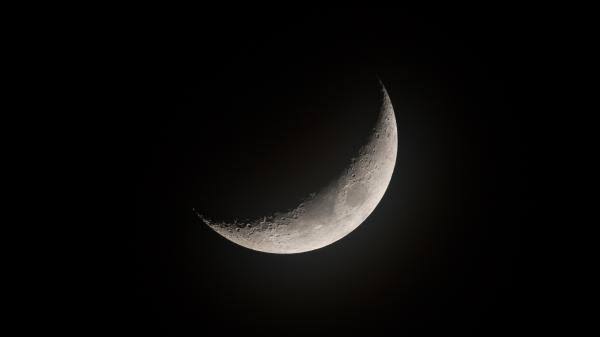The National Space Research and Development Agency (NASRDA) has announced that Nigeria is set to witness its first astronomical lunar crescent of the year on Feb. 28, 2025.
Dr. Felix Ale, Director of Media and Corporate Communications at NASRDA, disclosed this in a statement on Saturday, highlighting the precise timing and visibility details of the lunar event.
According to Ale, the crescent is expected to occur at 1:45 A.M. West African Time (WAT), a period referred to as the Crescent Zero Hour. However, optimal atmospheric conditions and optical instruments such as binoculars or telescopes will be required for early detection.
“The lunar crescent will become visible to the naked eye in the evening of Friday, Feb. 28, between 6:17 P.M. and 7:35 P.M. across various locations in Nigeria,” he stated.
Maiduguri will be the first city to observe the crescent, appearing between 6:17 P.M. and 6:48 P.M., followed by Yola from 6:21 P.M. to 6:51 P.M. Other cities, including Damaturu, Kano, Katsina, Jos, and Kaduna, will witness the phenomenon between 6:22 P.M. and 7:12 P.M.
Further south, Enugu will experience the crescent between 6:42 P.M. and 7:32 P.M., while Abuja is expected to see it between 6:44 P.M. and 7:15 P.M. The last cities to witness the sighting will be Lagos and Abeokuta, between 6:59 P.M. and 7:30 P.M.
Ale advised observers to use optical aids when necessary and ensure they are positioned in locations with a clear view of the western horizon after sunset.
“This scientific report provides precise predictions for lunar observations across Nigeria, ensuring accuracy for those who rely on lunar phases for religious, cultural, and scientific purposes,” he noted.
The space agency encouraged researchers, scholars, and religious groups to utilize the findings and visit NASRDA’s official website (www.nasrda.gov.ng) for additional data and further analyses.
Dr. Bonaventure Okere, Director of the Centre for Basic Space Science and Astronomy (CBSSA), a unit of NASRDA, emphasized the significance of the lunar crescent, particularly for the Islamic community.
“The new crescent marks the first stage of the moon’s cycle and plays a crucial role in determining Islamic rites, such as the beginning of Ramadan fasting,” Okere explained.
He added that astronomers study moon cycles to generate the lunar calendar, track the moon’s rising and setting phases, and understand its daily visibility.
As anticipation builds for the celestial event, NASRDA remains committed to advancing space research and promoting scientific awareness in Nigeria.


